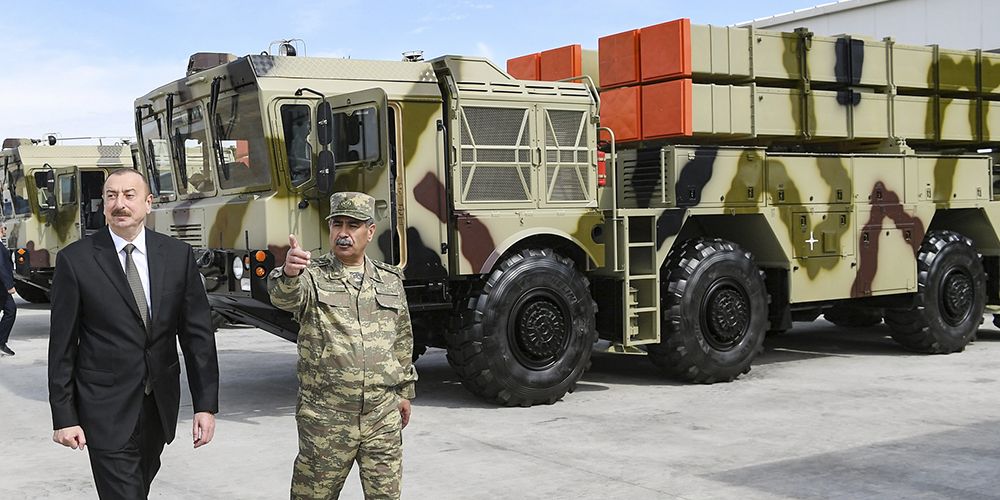Search

Publications
Belorussian defense industry for the armed forces of Azerbaijan

The delegation of the Defense Ministry of the Republic of Azerbaijan visited the Republic of Belarus on 13-16 July 2022. The two parties discussed the material and technical support issues of the armed forces of both countries, and shared their operating practices. According to the Media Relations Services of the Defense Ministry of Belarus, the visit of the Azerbaijanian defense officials took place «in accordance with the International cooperation plan for 2022», and the success of the negotiations «will allow for continuation of the mutually beneficial bilateral relations». [1]
The military and technical cooperation results
We need to highlight here that Baku indeed is one of the key partners of official Minsk in the military and technical sphere, and the respective agreement exists between the State Committee for the Defense Industry of Belarus and the Defense Ministry of Azerbaijan.
It is worth emphasizing that many aspects of collaboration in the military and technical sphere are classified, however, certain information is available in open sources allowing for the conclusion about the long-term and close cooperation between Azerbaijan and Belarus.
In particular, according to the UN Register of Conventional Arms, in the period from 2002 to 2012, Belarus supplied to its Azerbaijan partners 153 Т-72 tanks, 120 D-30 towed artillery systems of 122 mm caliber, 12 2S7 Pion self-propelled guns (SPGs) of 203 mm caliber, 60 wheeled armored personnel carriers BTR-70 and 11 Su-25 strike fighters. Subsequently, the Belorussian defense enterprises upgraded S-125M Pechora ADMS and 9K33M3 Osa Kalashnikov rifles in service in the Azerbaijanian army, and then Buk-MB ADMS was improved especially for Baku. The best-known deal in the history of bilateral military and technical cooperation is the purchase by Azerbaijan in 2018 the Belorussian Polonez multiple-launch rocket system (MLRS) with up to 300 km shooting range. [2]
Even though Polonez belongs to MLRS, its combat capabilities are comparable with those of the short-range ballistic missile systems. Due to using satellite navigation, Polonez assures precision target destruction at up to 300 km range with 10 m circular error probability. In 2019, Belarus announced its intent to develop the system based on Polonez-M capable of competing with Iskandar short-range ballistic missile system, including the development of the new types of guided missiles.
The presence of Polonez MLRS in the armed forces of Azerbaijan significantly improved their striking power and allowed for levelling out the presence of Iskander-E Russian-make short-range ballistic missile system in the Armenian army, balancing the capabilities of the parties in this class of weapons. Let us emphasize that it took only two years after Polonez MLRS appeared in the armed forces of Belarus to supply them to the Azerbaijanian army.
Hence, during the recent 20 years, Azerbaijan was the lead customer of Belarus in purchasing various types of weapons: No.1 for tanks and artillery systems; No.2 for armored vehicles; No.3 for combat aircrafts. [3]. In October 2020, at the height of the 2nd Karabakh War, the President of Azerbaijan Ilham Aliyev in his interview to Le Figaro called Belarus together with Russia, Turkey and Israel one of the «key suppliers» of machinery and weapons for the needs of the Azerbaijanian army. According to some experts, the overall cost of Belarus-Azerbaijan deals in weapons trade exceeded USD 1 billion.
Position of Armenia, response of Belarus and the role in CSTO
With account of the conflict between Armenia and Azerbaijan, the intense collaboration between Minsk and Baku in the military and technical sphere caused frustration of Yerevan, reflected in Armenian appeal to the allied relations within the CSTO. Upon closing the deal on selling Polonez MLRS, the Prime Minister of Armenia Nikol Pashinyan in his interview to the Polish Euroradio (currently classified as extremist media in the Republic of Belarus) emphasized that «Armenia and Belarus are strategic partners in the military and political spheres within the CSTO. All Armenian citizens are unhappy about Belarus selling weapons to Azerbaijan».
Minsk responded quite sharply by pro-government political analysts saying that «Belarus is and will continue to sell weapons to Azerbaijan». [4] In a certain sense, this view of Belorussian political analysts was in line with the words of the President of Azerbaijan Ilham Aliyev when he characterized the reaction of Armenia to the Polonez MLRS deal as «psychotic breakdown» and announced the intent to continue cooperation with Belarus in the military and technical sphere.
At the same time, the position of the official Belarus authorities was not as flat, however, they always stated that their cooperation with Azerbaijan was not contradicting to partner relations with Armenia and obligations within the CSTO. To justify their position, they used not only the CSTO Charter, but the approached of other members of the treaty organization. The example of the Russian Federation is especially illustrative, as its share in the overall import of defense items to Azerbaijan in 2006-2016, as per the estimates of the Stockholm International Peace Research Institute (SIPRI), constituted about 22%, which is in line with the statement by Ilham Aliyev about Azerbaijan purchasing the defense items from Russia for the total of more than USD 5 billion. [5]
It should be noted, that consequently the Armenian partners partially recognized the reasoning of Belarus. In particular, in his speech in the Armenian parliament, Shavarsh Kocharyan, the Deputy Minister of Foreign Affairs, recognized that «unfortunately neither the Charter, nor the Treaty, nor any other CSTO document contained any clause regulating selling weapons by the member countries to third parties. We understand that this not partner-like action, but from the international law standpoint we cannot claim the violation of that or another clause». [6]
Thus, despite certain negative emotions of the Armenian party the Belorussian diplomacy succeeded in making Yerevan recognize the judicial legitimacy of collaboration between Belarus and Azerbaijan in the military and technical sphere and stop the appeals to CSTO in this regards.
It is not unimportant that even though such collaboration and the friendly personal relations of Alexander Lukashenko with Ilham Aliyev triggered some Armenian-Belorussian frictions, they did not result in any deep conflict between the two countries. The 2nd Karabakh War, in which Azerbaijan won, did not result in any significant change in the positions of the parties: Baku and Minsk maintain their focus on continuing the cooperation in the military and technical sphere, Yerevan states «with regret» the legitimacy of the actions by Belarus.
At the same time, Minsk is insisting that such military and technical collaboration with Azerbaijan is not directed against Armenia, but reflects the will of the two sovereign states to partnership based on mutual benefits. Simultaneously, Belarus traditionally stands at the peace-making positions with respect to the Karabakh conflict. Until 2020, Alexander Lukashenko based on the trust of both parties made several attempts to propose compromise terms to Armenia on behalf of Ilham Aliyev, however Yerevan did not duly appreciate these efforts.
Moreover, Belarus maintains partner connections with Armenia in the military sphere, however, the capabilities of Armenia in terms of becoming potential customers of the Belorussian defense enterprises are significantly lower than those of Azerbaijan.
Outlook for Belarus and Azerbaijan collaboration in the military and technical sphere
The specifics of the personnel policy of the Foreign Affairs Ministry of Belarus (in particular, the figure of the Belorussian Ambassador to Baku) also proves certain focus of official Minsk on the Azerbaijan vector. Starting from November 2020, Colonel General Andrei Ravkov, the ex-Defense Minister and State Secretary of the Belarus Security Council, holds the position of the Ambassador to Baku. In this relation, Belorussian expert community has a common belief that by sending a high-ranking representative of the Defense and Security block to Baku Alexander Lukashenko emphasized one more time that his personal relations with Ilham Aliyev were based on mutual trust, as well as the importance of interaction of the two states in the spheres of defense and security.
It is quite symbolic that Ravkov’s successor as the Defense Minister, Lieutenant General Victor Khrenin paid his first foreign visit to Azerbaijan. Consequently, evaluating this visit, Andrei Ravkov emphasized that «an important «sparklet» appeared between the Defense Ministers of the two countries, Victor Khrenin and Zakir Hasanov, which will allow for further continuation of the existing agreements on military and technical cooperation». [7]
According to the available data, now the parties are paying special attention to bilateral projects in small arms development, the agreements on which were achieved during the visit by the Minister of the Defense Industry of Azerbaijan to the Belorussian Military Expo MILEX-2021.
It appears important that both Azerbaijan and Belarus have promising developments in this sphere, which potentially will allow for shifting to joint design projects. At the same time, the specialists of the Belorussian defense industry are closely studying the practices of the 2nd Karabakh War, including successful use of Turkish and Israeli UAVs by Azerbaijan. Minsk and Baku have strong possibilities to deepen their cooperation in this area, as well as in the context of implementing the missile program of Belarus.
In the course of his visit to Baku in April 2021, Alexander Lukashenko achieved some new agreements with Ilham Aliyev in some promising areas of bilateral military and technical collaboration, which were consequently detailed at the follow-up negotiations between Dmitry Pantus, the Chairman of the State Defense Industry Committee of Belarus, and Zakir Hasanov, the Defense Minister of Azerbaijan.
It is logical that Azerbaijan, having received a strong development impetus as a result of its victory in Karabakh, demonstrates its interest to reformatting the current military and technical cooperation with Belarus – shifting from upgrading the Soviet-make military equipment and importing the Belarus-make weapons to joint R&D meaning a higher level of interaction. Based on some official statements including by the President Alexander Lukashenko, Belarus is ready to satisfy any demands of its Azerbaijanian partners, and this means that Baku and Minsk are potentially ready to deepen their cooperation in the military and technical sphere and are capable of intensifying their collaboration.
1. Within the framework of international military cooperation. Official website of the Defense Ministry of the Republic of Belarus, 13.07.2022.
2. Belarus and Azerbaijan discussed the military and technical cooperation issues. Sputnik Belarus, 01.11.2021.
3. Valuable partner: what weapons did Azerbaijan purchase in Belarus during the recent 15 years? Sputnik Armenia, 23.10.2017.
4. Belarus is selling and will continue to sell weapons to Azerbaijan. Comments by Pyotr Petrovsky. MEDIA.AZ, 26.07.2018.
5. Azerbaijan purchased military items from Russia for USD 5 bn. TASS, 01.09.2018.
6. Ministry of Foreign Affairs of Armenia: Russia and Belarus can legitimately sell weapons to Azerbaijan. Moscow-Baku.Ru, 05.09.2019.
7. Specialist from Belarus are ready to build «smart cities» in Azerbaijan – the Ambassador. Sputnik Belarus, 02.07.2021.







